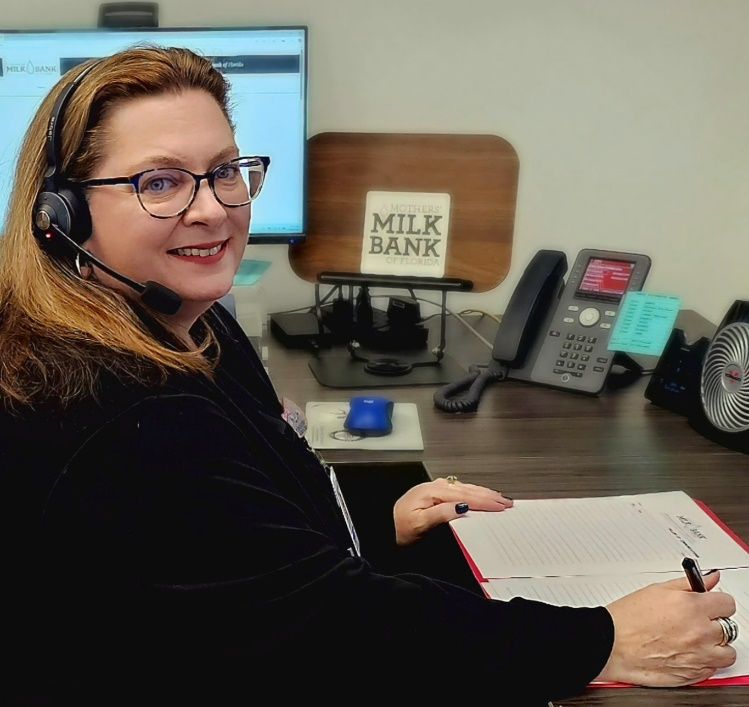This publication is intended for a general audience from all educational backgrounds. It explains the process of becoming a donor to the Mothers’ Milk Bank of Florida and why the criteria for being a donor screens for things that are often safe when feeding your own infant. The milk donated to milk banks goes to feed the sickest babies in Florida, which means even small doses of medications that are harmless to a healthy baby could pose problems in donor milk. The authors would like to thank all those who consider becoming milk donors. We know it is a lot of work, and that Mothers’ Milk Bank of Florida can only accept donations from women who do not expect any compensation for the donated milk. Milk donors give the most fragile babies the gift of life: Thank you.
What is a human milk bank anyway?
A milk bank is a place where moms who have extra breastmilk can donate it to help babies who need it. These babies are often born too early or are very sick, and they need extra care. Milk banks work to ensure donated milk is collected and processed in ways that make it safe to feed even the sickest babies. In Florida, the Mothers’ Milk Bank collects and processes donated milk to send to hospitals and save babies’ lives.
How does a mother become a milk donor?
If a mother wants to donate milk, she needs to be producing more milk than is needed to feed her baby. She also needs to be willing to donate milk without expecting anything in return. Here are the steps required to become a milk donor:
- Call the milk bank. The first step is to call the milk bank at (407) 248-5050. On the phone, you will speak to someone who will ask some initial questions about the mother’s health, any medications or vitamins the mother takes, and how the breastmilk is stored. It is important to store milk in dated bags because human milk can be too old to safely feed the sickest babies!
- Complete the questionnaire. After the phone call, mothers are asked to complete a questionnaire. The questionnaire is much more detailed than the questions asked by phone, but it will also ask about the mother’s health, any medications or vitamins the mother takes, and lots of details about how the milk is stored. The reason for all the questions on medications is that a mother may take a medication that is safe for her baby, but because donor milk goes to very sick babies, the medications need to be safe even for the most fragile babies.
- Read the Welcome Pamphlet. If a mother becomes a donor, she will be sent a Welcome Pamphlet. The pamphlet talks about important rules for donating milk. For example, mothers who smoke cannot donate milk even though they should breastfeed their own infants. This is again because donor milk goes to very sick babies.
- Get a doctor’s approval. Mothers need to give their doctors permission to answer a few questions for the milk bank, including whether mothers have certain illnesses like HIV or have received certain treatments.
- Take a blood test. The blood test is free for mothers; the milk bank pays for it. Now, the milk the mother donates is ready to be processed to save the lives of babies!
- Keep up with the milk bank. As long as a mother is donating milk, the milk bank will keep in touch with her to ensure her milk is still safe for very sick babies.

Credit: Permission to use photo granted by Angela Szymanski and Gladys Smith (photographer), Mothers’ Milk Bank of Florida.
Donating Milk After the Death of a Baby
Some moms donate stored milk after their baby dies, or they continue to pump and donate milk in honor of their baby. This is an extraordinary gift that has a lasting impact by saving the lives of other babies. To all the mothers who make this gift, thank you.
What other ways can someone help the milk bank?
People who are not breastfeeding can also help the Mothers’ Milk Bank of Florida! There are two other ways people can help the milk bank:
- Donate money. If you are able, donating money helps the milk bank. It costs money to test, process, and distribute milk. Donating money makes the milk more affordable for infants who need it.
- Donate time. If you live near Orlando, you can volunteer to help the milk bank process milk and organize paperwork. The time of volunteers helps make the lifesaving work of the milk bank possible.
Please see https://milkbankofflorida.org/get-involved/ for more information on how to donate money or time. Thank you for your help in saving the lives of Florida babies!